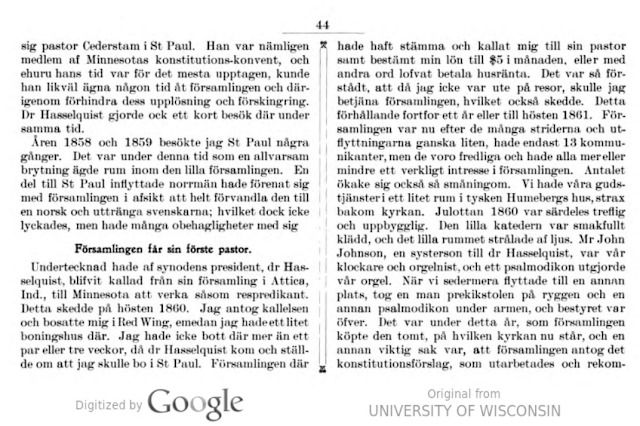Eric Norelius, turn-of-the-century president of the Augustana Synod and historian of its early days, displayed a wry, understated sense of humor. Below are: (1) my translation of his account of worship services at First Swedish Evangelical Lutheran Church in St. Paul in 1860 and 1861; and (2) quotes from Norelius' published accounts of the early days.
In the 1860s Norelius was a circuit rider based in Vasa, just west of Red Wing, Minn., and for a while in St. Paul. His recollection of his first Christmas in Minnesota appears in several of his reminiscences. This, notably, in the 50th anniversary album of First Swedish Lutheran Church in St. Paul:
… We had our services in a little room in the German Humeberg's house directly behind the church. Julotta 1860 was extraordinarily pleasant and edifying. The little teacher's desk was tastefully covered, and the little room was radiant with light. John Johansson, nephew to Dr. Hasselquist, was our parish clerk and organist, and a psalmodikon made out as [utgjorde] our organ. When we subsequently moved to another place, one man took the pulpit on his back and another the psalmodikon under his arm, and the chore was over. (Jubel-Album 44)[My translation.]
Humeberg was a German landlord. Dr. Tufve Hasselquist, then of Galesburg, later became one of the founders of Augustana Synod.
Eric Norelius. The Pioneer Swedish Settlements and Swedish Lutheran Churches in America, 1845-1860. Trans. Conrad Bergendoff. Rock Island: Augustana Historical Society, 1984.
On October 25, 1860 the congregation met to elect a pastor and issued a call to Pastor E. Norelius. There was no prose of a salary but the congregation agreed to pay $5 a month for the pastor's rent, as well as arranging for the place. It was understood that the pastor was to have his headquarters in St. Paul and serve the congregation when he was home, otherwise he was to serve as a traveling missionary in the parts of Minnesota he was able to reach. A committee was appointed to hire an appropriate place for services, and it succeeded in renting a small room, almost a closet, from a German, Henneberg, a little north of the present location of the church.… The congregation was small, consisting of only 13 communicants in the summer of 1860, but grew slowly. Peace and unity prevailed, and the devotional hours in the small chamber were delightful and refreshing. Mr. John Johnsson led the singing, often with the help of a psalmodikon. The Christmas morning service 1860 was especially uplifting. The small pulpit was tastefully decorated, the small room was radiant with light, but the greatest joy was in the happiness with which the Word of God was received. The two most important achievements of the year were the acquiring of a lot for a church and the adoption of the normal congregational constitution. (311)
In his autobiographical Early Life of Eric Norelius, 1833-1862: A Lutheran Pioneer, trans. Emeroy Johnson (Rock Island: Augustana Book Concern, 1934), Norelius quotes from De Svensk Lutherska Församlingarnas Historia -- essentially the same account 13 members, "Peace and harmony prevailed …" -- services "pleasant and refreshing" -- "Mr. John Johnson (a nephew of Dr. Hasselquist) was our song leader, and sometimes he accompanied on a 'psalmodikon.'" -- julotta in 1860 -- "The services were being held in a building rented from a German by the name of Henneberg. It was located on the street directly back of the present First Lutheran Church of St. Paul" (287).
Cf. Emeroy Johnson, Eric Norelius: Pioneer Midwest Pastor and Churchman (Rock Island: Augustana Book Concern., 1954), p. 92: "In a rented room located in the area where the railroad yards are now, Norelius held a joyful Julotta service on Christmas Day, 1860. Lights and decorations helped to make it a festive occasion for all. John Johnson, a nephew of Pastor Hasselquist, led the singing, playing the hymns on his psalmodikon."


No comments:
Post a Comment